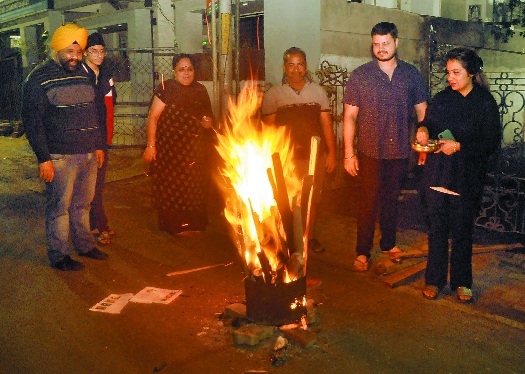People to pay gratitude to Surya Dev on Makar Sankranti
| Date :14-Jan-2022 |

By Rajendra Diwe :
Muhurta
Makar Sankranti on January 14
Makar Sankranti Punya Kala 14.43 hours to 17.52 hours
Duration - 3 hours 09 mins
Makar Sankranti Maha Punya Kala - 14.43 hrs to 16.33 hrs
Duration - 01 Hour 50 Mins
Makar Sankranti is one of the few festivals in India which is celebrated in many states across the country with different names. As per Vedic Astrology, “Makar Sankranti is a significant day as the Sun enters Makar Rashi (i.e. Capricorn zodiac).” As per Hindu tradition, “The Sun is worshipped and known as Surya Dev who nourishes all living beings on the Earth. Although all twelve months in Hindu calendar when Surya Dev transits a Rashi are considered significant for worshipping Surya Deva, taking religious bath in holy water bodies and performing charity activities but the day when Surya Deva starts moving into Makar Rashi is considered the most auspicious day of the year to worship Lord Surya.”
According to Rajandekar Panchang, “Uttarayan and transit of Sun in Capricorn are two different astronomical events as well as religious events. However thousands years before (precisely in year 285 C.E. as per Lahiri Ayanamsha) the day of Makar Sankranti was coinciding with the day of Uttarayana. The Uttarayana is combination of Uttara and Ayana which mean north and six months duration respectively. Hence, by the definition of Uttarayana, it occurs on the day of Winter Solstice.” Astronomically, “Makar Sankranti is significant due to the transit of Surya in Makar Rashi and Uttarayana is significant due to Surya beginning Northern journey (i.e. start moving into Northern hemisphere) after completing His six months Southern journey.”
As per Drik Panchang, “In modern India, people have stopped observing Winter Solstice for any religious activities however Bhishma Pitamah chose Uttarayana i.e. Winter Solstice to leave his body even the day of Uttarayana was not coinciding with Makar Sankranti during Mahabharata era. Hence, the day of Winter Solstice is also religiously significant to worship Surya Deva as per Vedic astrology. Makar Sankranti is a major harvest festival is also a wrong assumption.” Drik Panchang stated, “The day of Makar Sankranti continuously drifts away from winter solstice. In year 1600, Makar Sankranti fell on January 9, and in the year 2600, Makar Sankranti would fall on January 23. After 5000 years of 2015, i.e. in the year 7015 Makar Sankranti would be observed on March 23, much after winter season in India and Vernal Equinox. It shows that no way is Sankranti or any other Hindu festivals are linked to seasons. However in current time it happens to be harvest season (at least in some parts of India) at the time of Makar Sankranti and it adds zest to the Sankranti festivities.
Makar Sankranti Phalam
n In Maharashtra people are keen to know the effects of Makar Sankranti.
n According to different almanacs the effects are as follows:
n Good for learned, scholar and educated people
n Commodities cost would be normal
n Brings fear and anxiety
n Good health for people, affinity among nations and increase of grain stocks.
India celebrates Sankranti with different names
n In Tamil Nadu, Sankranti is known as Pongal and it is celebrated for four days.
n In Gujarat, Sankranti is celebrated as Uttarayana.
n In Andhra Pradesh, Sankranti is known as Pedda Panduga and similar to Tamil Nadu it is celebrated for four days.
n In Rajasthan, Makar Sankranti is known as Uttarayana.
n In Haryana, Makar Sankranti is known as Maghi.
n In Punjab, Sankranti is celebrated as Lohri and is observed one day before of Makar Sankranti.
n In Assam, Sankranti is known as Magh Bihu or Bhogali Bihu or Maghar Domahi.
n In Karnataka, Sankranti is known as Sankranthi and Makar Sankramana.
n However, in all regions Sankranti is observed as the day of thanksgiving to Surya Dev, the Lord of the light and energy who nourishes all living beings on the Earth.
n Sankranti Punya Kaal is different for all cities.
n In most regions, Sankranti festivities last for two to four days.